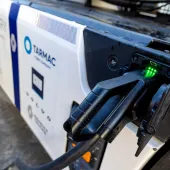BMAPA Sustainable Development Report published

Latest report builds on wider sustainable development initiative established by the Mineral Products Association
THE British Marine Aggregate Producers Association (BMAPA) has published its annual Sustainable Development Report covering the year 2018. This builds upon the wider sustainable development initiative established by BMAPA’s parent organization, the Mineral Products Association (MPA).
Following the launch of the MPA Charter in 2017, the 2018 report is now structured to align the existing key performance indicators defined in the original BMAPA Strategy document produced in 2006 with the seven MPA strategic priorities.
The report, which presents marine aggregate market and performance data from 2017, details the contribution of marine sand and gravel resources to the overall demand for construction aggregate across England and Wales. The relatively flat levels of demand reported for marine supplies alongside the majority of other sources of construction aggregate, coincide with low levels of growth reported across the economy as a whole.
Some key points from the report include:
Health and Safety – The industry continues to collate and report lost-time injury (LTI) and wider accident incidents on a monthly basis, and at the end of August 2018 achieved the notable target of 12 months LTI free for the first time since January 2009.
Resource Use – Total marine aggregate production remained largely flat in 2017 at 19.0 million tonnes, reflecting the general market conditions. This was reflected in reported landings to England and Wales and to the south-east of England. Over the same period, exports of construction aggregate to the near Continent continued to recover in 2017, with a 13% increase in landings to 3.1 million tonnes compared with the equivalent figures for 2016.
Climate Change and Energy – A reduction in total distance steamed by the dredging fleet coupled with overall production remaining broadly stable during 2017, resulted in an 3.9% increase in the ratio of tonnes landed per kilometre steamed to 14.0 tonnes/km. Combined with a slight reduction in total fuel consumption and associated CO2 emissions, the overall trends in reported data over time suggest continued improvements in efficiency over a rolling five-year period.
A copy of the BMAPA Sustainable Development Report 2018 can be downloaded below.









